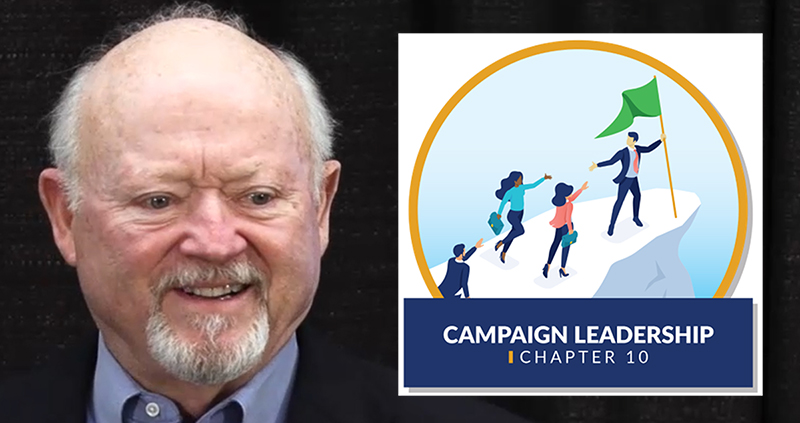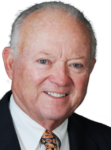
Major Gifts Campaign Leadership w Hall Powell is one veteran fundraiser’s take on the difference between failure and success when raising major gifts. Here’s what Hall Powell has to share:
“It’s not the will to win that matters –everyone has that, it’s the will to prepare to win that matters.” Those words spoken by Paul “Bear” Bryant, the legendary football coach for The University of Alabama, is the essence of what Major Gifts Ramp Up (MGRU) is all about. Major Gifts Ramp is all about winning, but in order ensure a win for your organization, you have got to prepare to win. MGRU not only prepares you for winning, IT WINS!
Coaching is about preparation; preparation is about winning. The sports analogy applies to fundraising also. For a successful fundraising program and/or campaign, there must be planning and implementation (like practice and playing). Successful football coaches, like “The Bear,” have good plans for a game (like a Case for Support), and they implement the plan with team leadership (like a Chair person). If a football team doesn’t have an effective quarterback, they are not going to win. The same principle is true in major gift fundraising. Okay, enough with analogies, let’s talk fundraising.
Major Gifts Campaign Leadership w Hall Powell
My experience, both as a fundraising consultant and chief development officer, is that in order to ensure a campaign’s success, you must have strong leadership who will, in turn, help you develop a winning campaign team of trained volunteers who will successfully implement the campaign plan. This also presumes that the campaign leadership team can present a compelling case for support to prospective donors. You might ask, “How do I recruit a campaign chair person, and how will I know that they will be successful?” There are three key steps to help ensure that the campaign chair will produce a winning campaign team: Recruitment, Training, Implementation.
Major Gifts Campaign Leadership RECRUITMENT
Most of us fundraising professionals associated with NANOE (National Organization of Nonprofit Organizations & Executives), don’t believe that we should place the burden of leading a major gifts campaign on a board member. By the same token, it is very possible that the best candidate for the campaign could be a board member. The campaign cabinet should be recruited from the community and could include board members also. The committee would serve as an ad-hoc committee to the organization’s governing Board. One of the benefits of creating a campaign cabinet from people in the community is that by involvement in the organization’s major gifts campaign, there is the possibility that some of the cabinet members could be potential, future board members.
VISIT HERE TO MEET HALL POWELL AT A MAJOR GIFTS RAMP-UP EVENT
When there is a compelling reason to launch a major fundraising campaign, the first step in implementation is to develop an executive summary of why the organization needs to raise the money through philanthropy. As a fundraising consultant, I always planned to have the chair person(s) of the proposed major gifts campaign identified and recruited as soon as the client could furnish me an Executive Summary of the Case for Support. The executive summary is to be a simple 2–3-page document which overviews the rationale for conducting the campaign. It, like it’s ultimate presentation document, must be compelling, but simple, for the purpose of recruiting leadership to the Campaign Cabinet who will take ownership in the “fleshing out” of the final, larger, public document to be used in the campaign.
You might ask, “Where do I find the campaign chair person?” Using the football team analogy, how do we find the best coach? This is the most critical question. So many nonprofits make the mistake of naming an “Honorary Chair” person, thinking that his or her affluent name will be sufficient to draw in significant gifts for the campaign. While honorary chairs or co-chairs can be an asset, and offer credibility to the campaign, there still must be the “real” chair person who, like the football coach has the ability to lead the team to victory.
The campaign chair(s) should be recruited early in the campaign process, soon after the case for support summary is in printed form, so that the chair person can help “flesh out” the final version of the Case for Support, that will also contain the campaign plan. My reason for this is that in producing an important document like “The Case,” staff and leadership of the nonprofit organization in need of philanthropic funds, sometimes makes the mistake of being technically correct in their presentation of facts, but also, unintentionally, technically confusing to the prospective donor who may or may not understand institutional jargon or professional terminology and acronyms. The layperson volunteer leader can help to draft a document that is better understood by the potential donor, one that relates better to his or her understanding of the institution and its need for support.
When the Case Summary is finalized, develop a list of potential campaign leaders (chair and cabinet members), people who have the standing, the credibility for recognition in the community as being the “guarantor” of the importance and urgency of the campaign. The person (or persons) for chair (or co-chair) must be one who is committed to the success of the campaign: “If my name is on it, it’s going to be successful. We will not fail to achieve our goal.”
There must be a job description for both campaign chair(s) and the campaign cabinet committee (samples fan be found in the MGRU Cloud via NANOE)
Major Gifts Campaign Leadership TRAINING
The completed and produced (in brochure form) Case for Support will be used to train the Campaign Cabinet (committee) and as a supporting document to review with prospective donors to the campaign. It will accompany all proposals for philanthropic gifts. This whole process is demanded by the mantra of successful major gifts fundraising: If you have a compelling reason, backed by a sound plan, the money will follow.
VISIT HERE TO MEET HALL POWELL AT A MAJOR GIFTS RAMP-UP EVENT
The CEO, Chief Development officer and staff, and campaign leaders (Cabinet) need to be trained in how to present Case and how to “Make the Ask.” One of the primary purposes of “the Case,” is to train the volunteer leadership to thoroughly know the rational (justifiable purpose) for the campaign, and how to represent it to prospective donors. We don’t want the campaign cabinet members to actually help to produce the document, to impose that time-consuming task on them, but as they offer input, and review the staff’s production efforts, they will be asked for final approval. The process of the cabinet’s input, review, and approval prepares the leaderships team to be asked for their advance gifts, the first gifts to the campaign. It will also be used as a “leave behind” document as part of the cultivation and making the ask of prospective donors.
Along with the printed Case for Support, a Campaign Visitors Manual should be prepared for the campaign cabinet members. This manual will provide the campaign’s volunteer leadership team a detailed campaign plan, with timelines, steps in the fundraising process, suggestions for dialogues with prospective donors, script for how to make “the ask,” and much more (See samples in Cut and Paste Library in NANOE).
The campaign cabinet members must also be trained in the art of making the ask of a potential donor. Most people don’t like to ask for money, and the thought of it can be intimidating for volunteer leadership members. Don’t assume that people know how to ask for a major gift, even though they might be “people of means” themselves. I find this to be true of some development (fundraising) people also. That helps to explain why the default efforts to raise funds for a nonprofit organization are often special events, direct mail, and grant seeking.
Make sure you train your volunteer “askers, the Campaign Cabinet,” know how to make the ask. You can watch one of my “Making the Ask” seminar presentations (insert link) which can be found in the cloud archives of NANOE.
Major Gifts Campaign Leadership IMPLEMENTATION
When the campaign cabinet is recruited and trained, and prospective donors have been identified, qualified, and assigned to individual cabinet members (five names each), the campaign chair will launch and implement the campaign plan. Regular, monthly campaign cabinet report meetings will be conducted to keep the campaign on schedule and provide accountability from each committee member.
The campaign’s chair(s) must lead by example and assist each of her or his cabinet member as needed. A good coach wants each of his team members to succeed, and will provide whatever is needed for success.
Closing Thoughts
When I think about successful major gifts campaigns, I see the commonality in all of them: they had a compelling case for support, backed by a sound plan, led and implemented by a strong, dedicated campaign chair. I think of the very first major gifts campaign I served as the campaign’s consultant. I was trained by Ketchum, Inc., which was at that time the oldest and largest nonprofit fundraising consulting firm in the country. They assigned me to a client in Memphis, Tennessee that was a nonprofit youth organization in need of raising funds to build new residential cottages and renovate the existing cottages. The husband of one of the governing board’s members was recruited to be our campaign chair. I will call him Spence. He was a prominent businessman who was determined to raise the money needed to help change the lives of children who, without help, would be destined to hardship or worse.
Spence put together a campaign cabinet from the greater community of Memphis, young, upcoming business and industry professionals who together, not only made their goal, they tripled it!
When I first was introduced to Spence, he said to me, “Hall, we have got to help these children. Don’t worry, we will raise the money.” He knew how to play the game. He knew what it takes to win. He had proved it in business, and proved it again in the nonprofit sector.
Great win coach! Good game!
VISIT HERE TO MEET HALL POWELL AT A MAJOR GIFTS RAMP-UP EVENT
Major Gifts Campaign Leadership w Hall Powell was first posted at National Development Institute
For more articles like Major Gifts Campaign Leadership w Hall Powell VISIT HERE
About The Author:
 Hall Powell has served as Senior Vice President of Development Systems International (DSI) for more than a decade and has 34 years of fundraising experience, including 19 as a fundraising consultant. He has provided campaign and development counsel to a wide variety of institutions throughout the country, with special emphasis in the healthcare field. Prior to joining DSI, Hall was senior consultant with the fundraising consulting firm Alexander Hass of Atlanta, Georgia. Previously, Hall served as the Executive Vice President of the Memorial Health Foundation, Inc. in Savannah, Georgia, and the founding Executive Director of the New Hanover Regional Medical Center Foundation, Inc., in Wilmington, North Carolina. He spent more than four years as the founding Director of the Amethyst Foundation in Charlotte where he played a significant role in the development of a nonprofit management seminar for Winthrop University. He also served as Director of Graduate Administration at Winthrop and was responsible for directing the Executive MBA Program as an Associate Professor in the Management Department. A seasoned lecturer in the nonprofit sector, Hall has also been an instructor with the Duke University Nonprofit Management Seminar. A Certified fundraising Executive, Hall Powell has served on the national board of directors of the National Society of Fundraising Executives, now known as the Association of Fundraising Professionals (AFP). He has also been instrumental in forming two AFP chapters. He holds an undergraduate degree from Guilford College and an MBA from Winthrop University. Hall Powell also engaged in graduate studies at Columbia International University. In his role as a fundraising counselor, Hall Powell is a strong advocate of the underlying philosophy of “donor-centered fundraising,” meeting the need of the donor to give, not putting the needs of the nonprofit organization as the primary motive for the donor/institution relationship. With this underlying philosophy for building comprehensive fundraising programs for institutions he served as Chief Development Officer, and for those he serves as fundraising counsel, he supports the Major Gifts Ramp Up Model. The model, accurately presented in 13 chapters built upon tried and proven best practices for successful major gifts fundraising, emphasizes building capacity for the nonprofit organization and long-term donor relationships. Finally Hall, is the author of The Missing Link: A Guide to Spiritual Reality
Hall Powell has served as Senior Vice President of Development Systems International (DSI) for more than a decade and has 34 years of fundraising experience, including 19 as a fundraising consultant. He has provided campaign and development counsel to a wide variety of institutions throughout the country, with special emphasis in the healthcare field. Prior to joining DSI, Hall was senior consultant with the fundraising consulting firm Alexander Hass of Atlanta, Georgia. Previously, Hall served as the Executive Vice President of the Memorial Health Foundation, Inc. in Savannah, Georgia, and the founding Executive Director of the New Hanover Regional Medical Center Foundation, Inc., in Wilmington, North Carolina. He spent more than four years as the founding Director of the Amethyst Foundation in Charlotte where he played a significant role in the development of a nonprofit management seminar for Winthrop University. He also served as Director of Graduate Administration at Winthrop and was responsible for directing the Executive MBA Program as an Associate Professor in the Management Department. A seasoned lecturer in the nonprofit sector, Hall has also been an instructor with the Duke University Nonprofit Management Seminar. A Certified fundraising Executive, Hall Powell has served on the national board of directors of the National Society of Fundraising Executives, now known as the Association of Fundraising Professionals (AFP). He has also been instrumental in forming two AFP chapters. He holds an undergraduate degree from Guilford College and an MBA from Winthrop University. Hall Powell also engaged in graduate studies at Columbia International University. In his role as a fundraising counselor, Hall Powell is a strong advocate of the underlying philosophy of “donor-centered fundraising,” meeting the need of the donor to give, not putting the needs of the nonprofit organization as the primary motive for the donor/institution relationship. With this underlying philosophy for building comprehensive fundraising programs for institutions he served as Chief Development Officer, and for those he serves as fundraising counsel, he supports the Major Gifts Ramp Up Model. The model, accurately presented in 13 chapters built upon tried and proven best practices for successful major gifts fundraising, emphasizes building capacity for the nonprofit organization and long-term donor relationships. Finally Hall, is the author of The Missing Link: A Guide to Spiritual Reality


